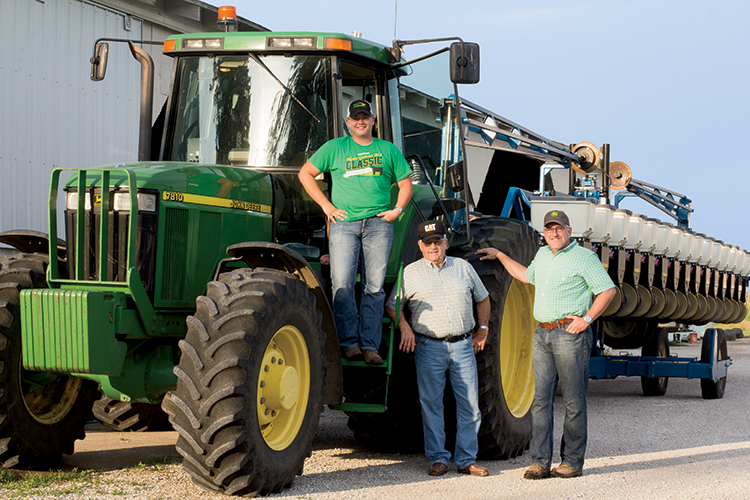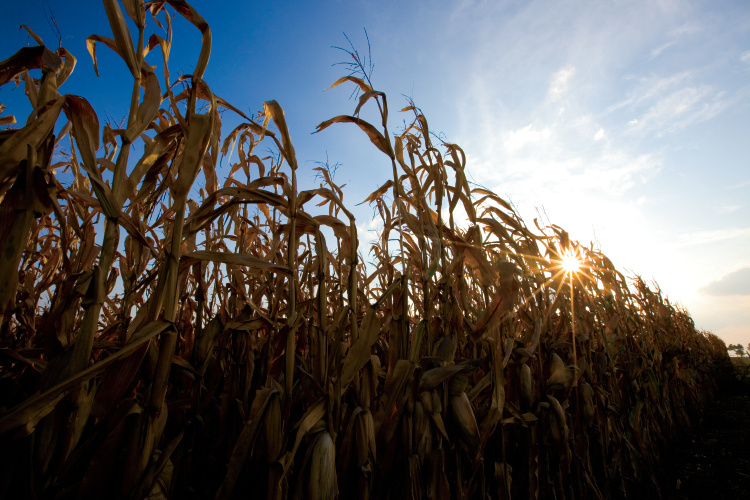Home > Missouri > Missouri Farm to Table > Missouri Farm Families Matter
Missouri Farm Families Matter

Ask any farmer, and they’ll tell you that family is at the core of their career. In Missouri, almost 90 percent of the state’s 99,000 farms are family owned and operated.
Whether they’re producing the state’s top commodities, embracing new technologies or implementing sustainable farm practices, Missouri’s farm families are the motivating force in driving the state’s No. 1 industry forward.
No one knows this better than the Missouri Department of Agriculture’s director, Richard Fordyce. As a fourth-generation farmer, Fordyce has learned from those who came before him how to be the best steward of the land and serve as an example for future agricultural leaders.
Fordyce and his wife, Renee, raise corn, soybeans and beef cattle on his farm in Bethany, which has been in his family since the late 1800s. He began farming full-time in 1984 and still works with his 82-year-old father, who remains very active on the farm.
“When asked what I’ve learned from being raised on a farm, the first thing that comes to mind is work ethic,” Fordyce says. “When you’re involved in agriculture, a lot of holidays on the calendar are irrelevant. When you have to plant, you plant, and when you have to harvest, you harvest.”
Fordyce’s two children, a son enrolled in the University of Missouri’s College of Agriculture, Food and Natural Resources and a daughter in high school who currently serves as president of her FFA chapter, are both connected to agriculture and help out on the farm when needed. And while Fordyce hopes to pass along the family business, he says he’s proud that both of his children will be involved in agriculture, even if they don’t pursue production farming.

“I can’t think of a more noble occupation than working in agriculture,” he says.
Because his own family business is extremely important, Fordyce says it helps him relate to other Missouri farmers.
“There are lots of rewards, but also lots of challenges working on a family farm,” he says. “I know because I do it.”
He adds that the size of the operation doesn’t matter when it comes to family farms. Some consumers have a romanticized view of family farms as small and quaint, when that’s not the case. Many larger farms are family owned as well.
“It’s more than just a family farm,” Fordyce says. “It’s a family business with family values.”
Love Of The Land
Sustainability is at the forefront of everyone’s minds these days, but don’t forget: farmers are the original environmentalists.
With this in mind, the Missouri Department of Agriculture launched the Agricultural Stewardship Assurance Program, which emphasizes farmers and ranchers that practice environmental stewardship, provide safe food for consumers, and use science-based technology to grow safe and dependable feed, fuel or fiber in a socially and economically friendly manner.
The free program verifies producers in the areas of cropland, grassland, livestock, forestry, farmstead and energy that are implementing efforts such as crop rotation, no-till, nutrient management, appropriate livestock manure storage, and management and proper storage of chemicals and fuel.
Learn more about the program at agriculture.mo.gov.

Market News
Farmers work hard to feed the world. What many don’t realize is that those same farmers are also savvy businessmen and women.
To help Missouri’s producers easily find the information they need to run a successful business, the Missouri Department of Agriculture launched the Missouri Ag Market News website, agmarketnews.mo.gov.
The site features the most up-to-date market information for Missouri agriculture, including price information for commodities such as cattle, sheep, goats, swine, grain, hay and forages.
Farmers can find daily and weekly updates in both audio and video formats, plus weekly reports in a traditional text format. The site also features more than 10 years of historical data and graphs, and is compatible with mobile devices, which is important in today’s high-tech industry.
Visit agmarketnews.mo.gov to learn more.
Bio-Fueled For Success
Living up to its nickname, Missouri has a lot to show when it comes to biofuel production.
Home to the National Biodiesel Board, the state ranks second in the nation in biodiesel production, with more than 200 million gallons produced annually.
Corn and soybeans – the state’s two top commodities – serve as the main players in Missouri’s biofuels success. Just over 30 percent of Missouri’s annual corn crop goes into making approximately 300 million gallons of ethanol, a fuel that’s better for the environment since it burns cleaner and cooler than conventional gasoline.
Soybeans are used for biodiesel production as well, with the most recent numbers showing that soy oil from more than 50 million bushels of Missouri-grown soybeans was used for biodiesel.



